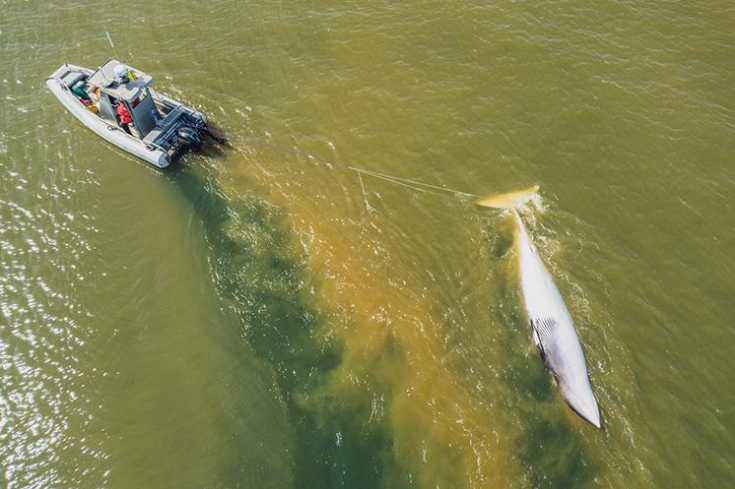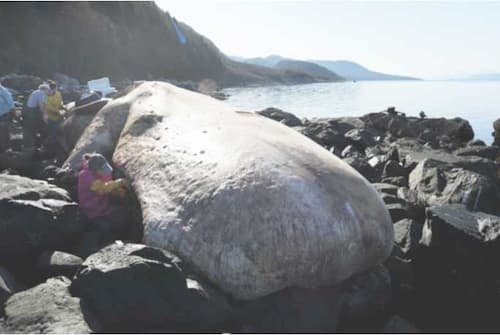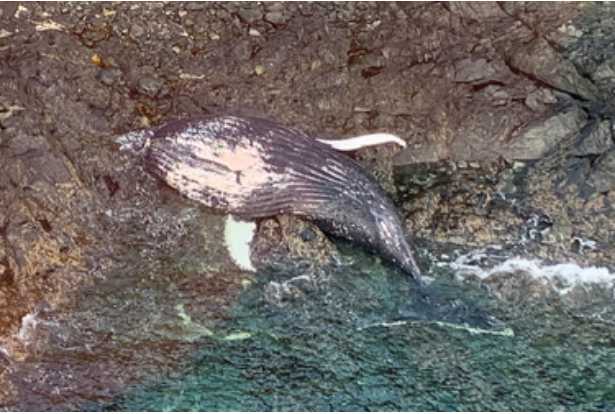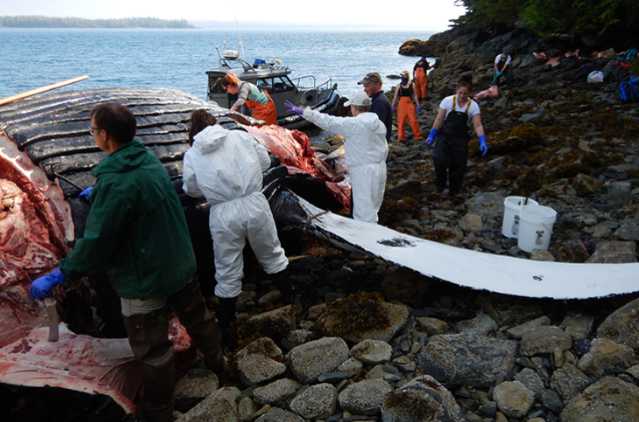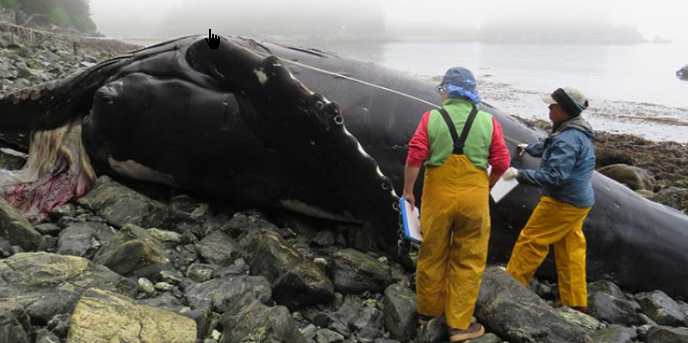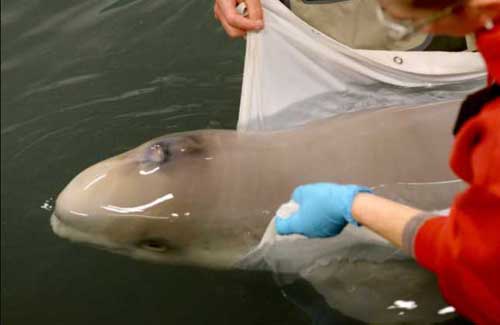The Alaska Marine Mammal Stranding Network and the Anchorage Community faced frigid temperatures to observe the deceased whale.

On the evening of November 16, the NOAA Fisheries Alaska Statewide 24-hour Marine Mammal Stranding Hotline received a report of a dead whale. It had been found on the beach near the Coastal Trail in Anchorage. The following day, biologists with the Alaska Veterinary Pathology Services and NOAA Fisheries collected information about the whale. They took photos, measurements, and some initial samples. Volunteers from the Alaska Marine Mammal Stranding Network assisted with data collection.
The biologists determined it was a female fin whale, measuring 47 feet long—about 2 feet longer than a school bus. Based on its length, the fin whale is estimated to be young, likely less than 2 years old. Adult fin whales can measure between 75 and 85 feet in length.
For 3 days, more than 20 authorized responders worked through frigid conditions to necropsy this whale during low tide and daylight hours. During the necropsy, temperatures ranged between 3°F and 20°F. The whale was frozen, which made tissue collection and examination difficult. Responders cut openings in the whale’s body, which helped them collect samples from targeted areas while keeping most of the body intact. However, the cold temperatures and frozen tissues greatly limited evaluation of the carcass and the scientists’ ability to examine the bones and tissues for signs of injuries or trauma.
Barbara Mahoney, NOAA Fisheries’ Alaska Assistant Regional Stranding Coordinator, praised the efforts of the responders, stating, “It was amazing and impressive how the stranding responders, Natalie Rouse and the Alaska Veterinary Pathology Services team, worked for hours in these freezing temperatures to collect samples that will help us all understand fin whales in Alaska.”

Despite the challenging weather conditions, the scientists successfully collected numerous tissue samples. These samples will be submitted to laboratories for a suite of analyses including tests to examine concentrations of harmful algae, the presence of pathogens, and histopathology (microscopic analysis) of tissues. These tests may provide clues about the whale’s health and possible cause of death. The necropsy was completed on November 26. It will take several months for some laboratory analyses to be complete.
The whale carcass is expected to remain on shore until higher tides return to Cook Inlet. If the whale remains onshore, Stranding Network members and authorized responders plan to return to examine its bones for evidence of injuries or trauma.
Natalie Rouse, a necropsy biologist with Alaska Veterinary Pathology Services, stated “We received so many questions from people of all ages. It’s humbling to see how many people are interested in the work we are doing.”
Although this is an incredibly rare opportunity to see a fin whale so close, local residents are reminded that fin whales are protected under both the federal Marine Mammal Protection Act and Endangered Species Act. Marine mammals may carry infectious diseases that can spread to humans and pets. Only trained and authorized responders should approach a stranded marine mammal. It is illegal for anyone to collect hard parts (including baleen) or soft parts (including tissues) from the whale, unless authorized. Learn more about marine mammal parts in Alaska.
Mandy Keogh, NOAA Fisheries’ Alaska Regional Stranding Coordinator, commented that “NOAA appreciates the many concerns and questions as to the health of this young fin whale, and we will find out as much as we can from the samples that were collected. We would also like to thank those in the public who have shown respect when visiting this whale.”
Fin whale populations were decimated by commercial whaling in the 1800s and early 1900s, which ultimately resulted in their listing as endangered under the Endangered Species Act. While commercial whaling is no longer a threat to fin whales, their populations are still recovering. Fin whales are the second largest whale species on Earth, second only to the blue whale. They are a baleen whale species, meaning they have baleen plates in their upper jaws instead of teeth. These baleen plates allow them to filter out large quantities of prey from seawater. Fin whales are typically found in deep, offshore waters throughout the world’s oceans. Their distribution is primarily driven by the availability of their prey, which includes schooling fish (such as herring and capelin) and zooplankton (such as euphausiids and copepods). In the Gulf of Alaska, they often occur along the continental shelf break, where mixing zones attract large concentrations of their preferred prey. To find a fin whale in the shallow waters of upper Cook Inlet is considered atypical.
Fin whale strandings are rare in Alaska; only 37 fin whale strandings have been documented in Alaska since 2010. Most of these strandings occurred in the Gulf of Alaska near Kodiak Island. In 2015, NOAA Fisheries declared an Unusual Mortality Event following an increase in stranded fin and humpback whales around Kodiak Island and the western Gulf of Alaska. This increase in strandings coincided with the 2014–2016 Northeast Pacific marine heatwave, which likely contributed to the UME. In upper Cook Inlet, there have been only two other reported fin whale strandings since 2010, one of which arrived on the bow of a ship. Fin whales, particularly juveniles, are thought to be vulnerable to vessel strikes due to their large size and the amount of time they spend at the surface. However, the cause of death of this stranded fin whale is undetermined at this time. Further analysis of samples collected during the necropsy and any additional examinations of the bones (if possible in the future) may provide more information on the cause of death.
All response activities were authorized under the Marine Mammal Health and Stranding Response Program NOAA Permit No. 24359.
If you see a stranded, injured, entangled, or dead marine mammal, immediately call the NOAA Fisheries Alaska Statewide 24-hour Stranding Hotline at (877) 925-7773.
[content id=”79272″]

